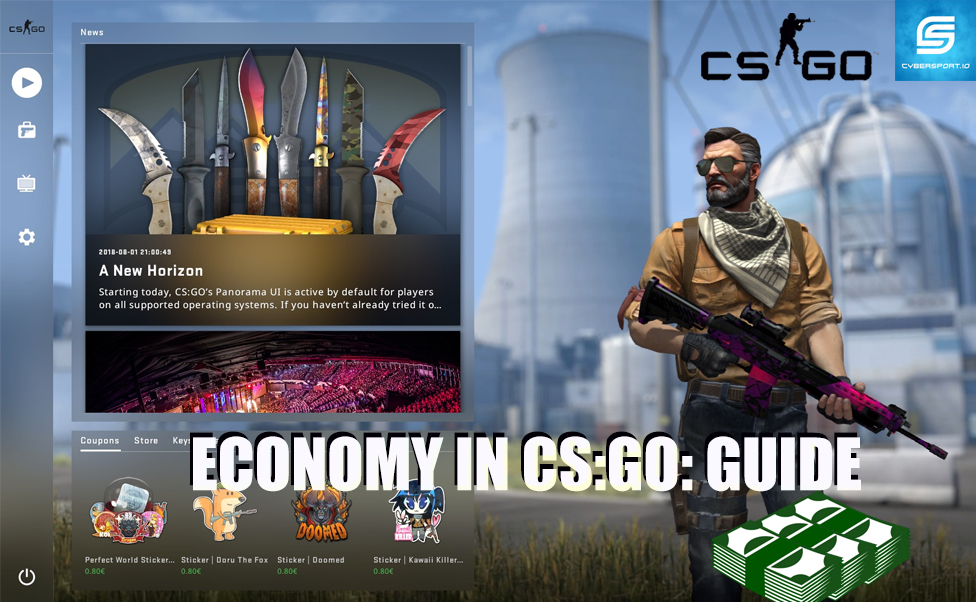79tka Insights
Your go-to source for the latest news and information.
Money Talks: Cracking the Code of CSGO Economy Management
Unlock the secrets of CSGO's economy! Discover expert tips and tricks to master your in-game finances and dominate the competition!
Understanding the CSGO Economy: Key Concepts and Strategies
The CSGO economy is a critical aspect of the game that heavily influences a team's performance and strategic decisions. Understanding the economy involves grasping key concepts such as money management, round wins, and losses. In each match, players earn in-game currency based on various factors, including kills, planting or defusing bombs, and winning or losing rounds. This currency is essential for purchasing weapons and armor, which in turn affects the team’s ability to win subsequent rounds. Players must make strategic choices about when to save money or invest heavily, often resulting in what is known as an "eco round"—a tactic where players spend minimal resources to maximize finances for future rounds.
To truly master the CSGO economy, players should consider the following key strategies:
- Communicate effectively with teammates regarding buy decisions and resources.
- Adjust your play style based on your team's economic status—if funds are low, prioritize survival to gather information for your team.
- Understand the opponent's economy by observing their spending patterns, which can help predict their strategies.
- Plan your eco rounds to ensure you maximize your ability to buy full weapons and equipment in subsequent rounds.

Counter-Strike is a popular first-person shooter game that has captured the hearts of gamers worldwide. For those curious about the competitive scene, you can learn more about what is premier cs2 and how it impacts gameplay.
How to Optimize Your In-Game Currency: Tips for CSGO Players
Optimizing your in-game currency in CSGO can significantly enhance your gameplay experience. One effective strategy is to understand the market trends and fluctuations of skins and equipment. By monitoring platforms like the Steam Community Market and third-party trading sites, players can identify when to buy or sell their items for maximum profit. Additionally, consider utilizing sites that track price histories to make informed decisions. Establishing a budget for your in-game purchases is crucial; always keep an eye on your spending to avoid unnecessary losses.
Another important tip for managing your in-game currency is to prioritize your purchases wisely. Focus on acquiring items that not only enhance your aesthetic appeal but also carry a good resale value. CSGO skins, knives, and other rare items can become valuable assets over time. To further optimize your currency, participate in community events, promotions, and giveaways, as they often provide opportunities to earn free skins or discounts. Remember, smart trading and careful planning are key to building a thriving in-game economy!
The Role of Eco Rounds in CSGO: When to Save and When to Spend
In CSGO, eco rounds play a pivotal role in shaping a team's economy and strategic decisions. An eco round refers to a period where players choose to save their money instead of purchasing weapons and utility items, usually following a loss or a series of unfortunate rounds. By opting for an eco round, players can accumulate enough resources to make a significant investment in upcoming rounds, potentially allowing for better equipment and utility. Understanding when to initiate an eco round is crucial; teams must recognize situations where holding onto their economy may lead to more advantageous setups in future rounds, ultimately giving them a chance to wrest control of the match back.
Determining when to save and when to spend during eco rounds can be a game-changing decision. Generally, players should consider saving during rounds where they lack sufficient funds to purchase rifles, armor, or grenades, particularly after a string of losses. Conversely, if a team can collect enough funds for a partial buy—such as buying a few upgraded pistols and utility—while still holding onto a decent amount for the next round, it can yield a competitive edge. Key factors include the current score, the opponent's economy, and the status of the bomb. An organized approach to eco rounds can swing the momentum in favor of a team, emphasizing the importance of strategic monetary decision-making in CSGO.